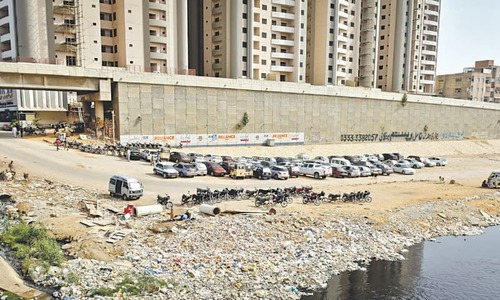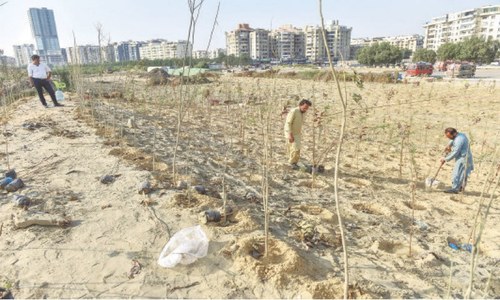KARACHI: Fifty acres of barren Lyari riverbed in Keamari district has been turned into an urban forest with thousands of native trees now flourishing in the area, some of them bearing fruit.
Launched early this year, the project is being implemented by the forest department that has so far grown 73,500 trees on both sides of the riverbed from Mauripur bridge to Shershah bridge.
The species included guava, java plum (jaman), sapodilla (chikoo), pomegranate, Indian coral tree (gul-i-nishter), Indian rosewood (shisham), lignum, Manila tamarind (jungle jalebi), parkinsonia species, neem, gum Arabic tree (keeker), Indian beech tree (sukh chain) and flame tree (gul mohar).
“It’s the first phase of the Lyari urban forest project that will soon be extended to a larger area,” said district forest officer Maqsood Ahmed.
These trees would help regulate monsoon flood, prevent sea intrusion and improve quality of air in the area, he added.
According to sources, the department has taken a number of plantation initiatives in Karachi and grown thousands of native plants over the past two years in localities, including Memon Goth, Shah Faisal Colony, Model Colony, Jinnah International Airport area, Gulistan-i-Jauhar, Bin Qasim town, Shaheed Benazir Bhutto Park in Clifton as well as along the M-9 Motorway and National Highway.
“The department’s activities have been enhanced since the launch of Green Pakistan initiative in 2018-19. Most of these plantations have taken place along Karachi’s outskirts since the department doesn’t own land within the city while the Lyari forest project’s site was personally chosen by [Pakistan Peoples Party chairman] Bilawal Bhutto-Zardari,” explained district forest officer Tahir Lateef, claiming that the department carried out active monitoring of all plantation sites.
According to him, the department within its limited resources has grown around 320,000 trees since 2019 in Karachi (excluding the plants grown in the Lyari urban forest).
Responding to a question about coordination with other agencies and departments, he regretted that there was no coordination. “Everyone is carrying out plantations independently. The district municipal corporations, Karachi Metropolitan Corporation and the various cantonment boards have their own activities.”
Officials said the major obstacle hampering sustainability of plantation initiatives in the city was the absence of Karachi-specific law for tree protection and plantation and imposition of a strict ban on cutting of tree(s) unless it was authorised by an expert committee.
In this respect, they cited a recent incident in Shah Faisal Colony where 1,000 fully mature trees were cut down.
“Nobody including the police was ready to cooperate and we couldn’t trace the culprits,” said a forest official, adding that the dream of making Karachi green could never materialise unless there was a law on tree protection and it’s strictly implemented.
Published in Dawn, August 23rd, 2021













































